|
Previous days - Back to main page
|
|
Press conference video statement
|
|
12 December
|
|
UNFCCC Executive Secretary Yvo de Boer briefing the press on the final day of the Conference
Download as Podcast
|
Briefing the media at the end of the two-week Conference, Yvo de Boer said that the main goal of delivering practical results on the road to Copenhagen had been achieved.
Parties had agreed on a work programme for 2009 that would lead to intensified negotiations. The Conference had also played an important role, he underlined, in pushing forward the European Union package on climate and energy.
Of critical importance to developing countries was the launch of the Adaptation Fund. Parties agreed that the Fund would be a legal entity granting direct access to developing countries. Significant progress was also made on a number of ongoing issues, including reducing emissions from deforestation and forest degradation (REDD).
A key event at the Conference was a ministerial round table on a shared vision on long-term cooperative action on climate change, where Ministers gave political direction on how to move together towards an agreed outcome in Copenhagen.
|
|
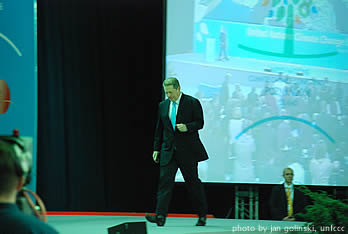
Former US Vice-President and Nobel Peace Prize Laureate Al Gore strides purposefully across the podium to deliver his speech
|
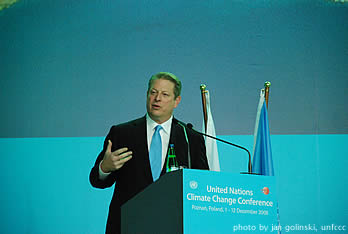
Al Gore addresses delegates on the urgency of the climate crisis
and the need for action
|
|
11 December
|
|
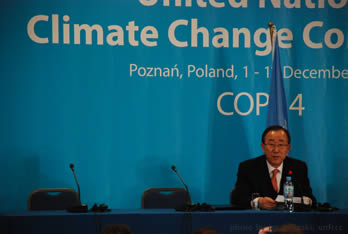
UN Secretary-General Ban Ki-moon taking questions at press conference
|
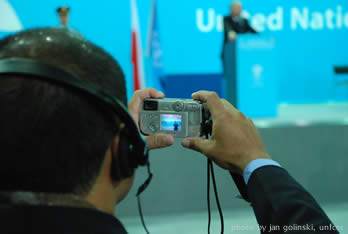
High-level segment from a different view
|
|
10 December
|
|
UNFCCC Executive Secretary Yvo de Boer briefing the press on the eighth day of the Conference
Download as Podcast
|
At today's press briefing a day before the start of the High-Level Segment of the Conference, Yvo de Boer said that delegates had managed to resolve a number of outstanding issues.
Two issues still had to be resolved. The first, the Adaptation Fund, was close to finalization, he said, with the question of direct access by developing countries seen as very important. The second outstanding issue was whether Carbon Capture and Storage should be allowed as a pilot or definite decision under the Clean Development Mechanism (CDM).
He added that it may take a little time for the Adaptation Fund to become fully operational, since the Fund is filled from a levy on credits obtained via the CDM, which would first have to be sold on the market.
The decks were now cleared for Ministers to hold a round-table discussion on a shared vision for long-term cooperative action, Mr. de Boer said, which he hoped would send a strong signal on cooperation and willingness to work together in order to meet the Copenhagen deadline for a strengthened agreement.
|
|
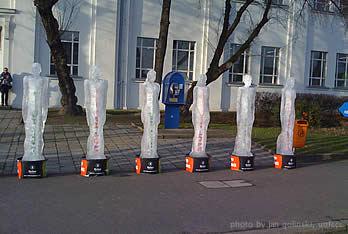
Symbolic ice sculptures standing on display
|
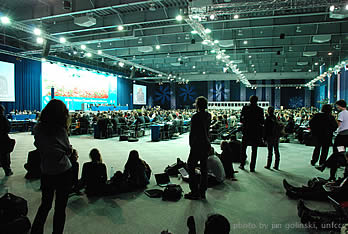
Closing session of SBSTA (Subsidiary Body for Scientific and Technological Advice)
|
|
9 December
|
|
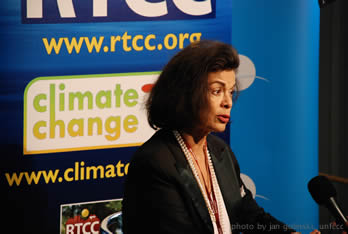
Bianca Jagger gives interview
|
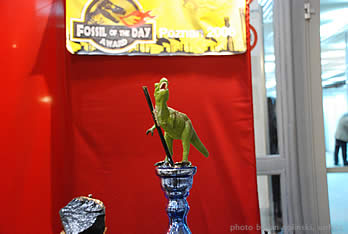
First prize of CAN's fossil of the day award
|
|
8 December
|
|
UNFCCC Executive Secretary Yvo de Boer briefing the press on the seventh day of the Conference
Download as Podcast
|
At the press briefing on the first day of the second conference week, Yvo de Boer gave an update on a number of issues under discussion. He said that in general, negotiations are going well and that countries are trying to identify new avenues instead of re-stating traditional positions.
On Adaptation, countries have been sharing 'success stories' in dealing with impacts of climate change, but were also identifying barriers in this area. Mr. de Boer informed about a proposal on the table to establish a new expert group on adaptation to enhance action on the ground.
He also highlighted the importance of risk and disaster management and insurance for the Copenhagen agreement. He said that this area is a fundamental requirement to meet adaptation objectives and that AOSIS is proposing an insurance mechanism to address loss and damage from climate change impacts.
The debates on REDD are focusing on conversation versus market incentives via credits to avoid deforestation. There was also discussion on how deforestation and degradation affect indigenous people. The suggestion has been raised to organize special consultations on this issue during next year.
Yvo de Boer remarked on the good work under the Kyoto Protocol. The so called 'spillover effects' are now more discussed as potential consequences of policies to address climate change.
|
|
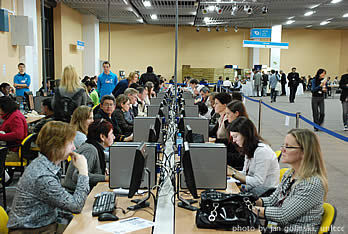
Participants at work in the Computer Centre
|
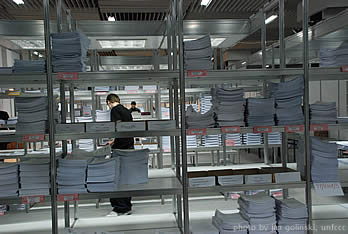
Official documents ready to be distributed for the sessions
|
|
6 December
|
|
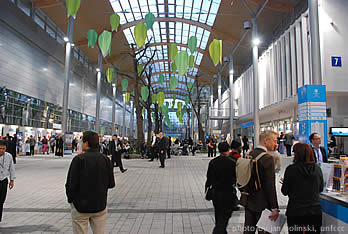
Inside view of the Conference venue
|
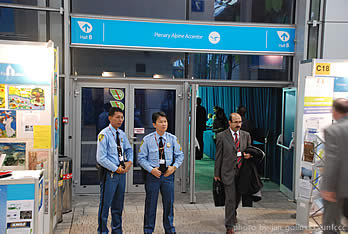
Security at the Conference
|
|
5 December
|
|
UNFCCC Executive Secretary Yvo de Boer briefing the press on the fifth day of the Conference
Download as Podcast
|
Briefing the media on day five of the Conference, Yvo de Boer said that serious discussions were emerging to launch the intensified negotiations needed to reach the 2009 deadline in Copenhagen.
Many delegates were highlighting the need to move to a low-carbon society, citing the emission reduction range of -25 to -40 by 2020 over 1990 levels for industrialized countries, and asking these countries to show ambition and leadership with regard to these targets.
There was agreement that financial mechanisms, including insurance, can play an important role within a strengthened response to climate change, and that financial mechanisms for risk management in developing countries needed to be scaled up.
Parties were also considering how to increase funds for adaptation through the carbon market, with discussions focusing on extending the current 2% levy on mitigation projects under the Clean Development Mechanism (CDM) to the other Kyoto mechanisms, Joint Implementation and Emissions Trading, Mr. de Boer said. He added that the inclusion of a limited number of Carbon Capture and Storage pilot projects under the CDM was also under discussion.
|
|
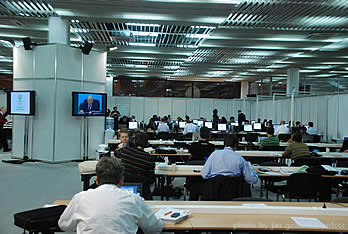
Accredited media at work in the press room
|
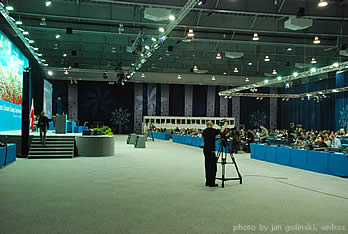
Preparing for the next plenary session
|
|
4 December
|
|
UNFCCC Executive Secretary Yvo de Boer briefing the press on the fourth day of the Conference
Download as Podcast
|
At today's press briefing in Poznań , Yvo de Boer gave an update on a number of areas under discussion, including Adaptation. An important issue was how to increase funding for Adaptation, particularly for Least Developed Countries, he said, adding that many countries had expressed their frustration over difficulties in accessing funding from the Least Developed Countries Fund.
During negotiations on mitigation potentials, Mr. de Boer said the need for developed countries to show leadership on reducing emissions was voiced strongly, amid criticism of the low level of ambition being shown by these countries.
With regard to a shared vision on long-term cooperation, he spoke of emerging convergence in a number of areas. There was agreement, for example, that it should be based on scientific findings; that it should involve specific targets for industrialized countries; and that the main building blocks should be mitigation, adaptation, finance and technology.
Delegates were also moving forward on the issue of reducing emissions from deforestation and forest degradation (REDD); an important element of a strengthened climate change agreement.
|
|
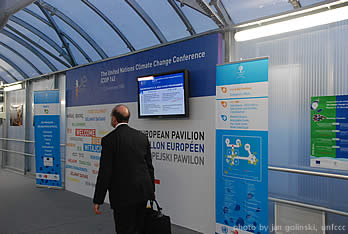
On the way to the next meeting
|
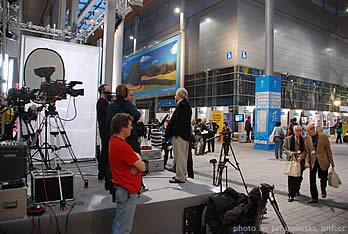
Reporting from the Conference
|
|
3 December
|
|
UNFCCC Executive Secretary Yvo de Boer briefing the press on the third day of the Conference
Download as Podcast
|
The market-based mechanisms under the Kyoto Protocol were highlighted by Yvo de Boer at today's press briefing; Parties in Poznań are considering ways to enhance the existing mechanisms and looking at the role mechanisms will play in the future.
Discussions continued yesterday on a shared vision on long-term cooperative action. Mr. de Boer said that during the discussions, developing countries gave a strong call for industrialized countries to show leadership and ambition in emission reductions.
On the issue of technology, he pointed to the strategic programme of the Global Environment Facility to scale up technology transfer, with many countries calling for its quick implementation. Underling the importance of both financial and technical support for all developing countries, Mr. de Boer said delegates in Poznań were also assessing how to scale up financing, including the role of both public and private financing.
The reporting of climate change actions by developing countries was also taken up at today’s briefing. On this important issue, Mr. de Boer said that delegates were discussing ways to support the preparation of these reports.
|
|
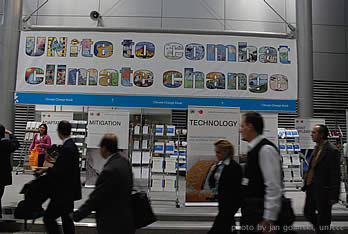
UN climate change campaign poster attracts attention
|
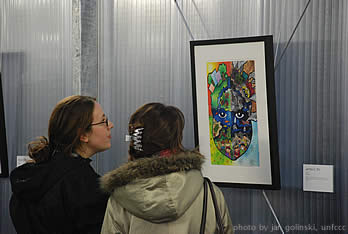
Taking time for artwork on display
|
|
2 December
|
|
UNFCCC Executive Secretary Yvo de Boer briefing the press on the second day of the Conference
Download as Podcast
|
At a press briefing on the second day of the Conference, Yvo de Boer expressed satisfaction with the results of the opening day, with all major groups having launched their work and the formation of contact groups now underway.
The group on long-term cooperative action got off to a positive start, he said, although there was a sense that Governments must speed up work, also on the issue of a shared vision for long-term cooperative action. He added that Governments were keen to move forward.
The working group under the Kyoto Protocol also got off to a good start. Many countries have emphasized that the focus of this group’s work at Poznań should be on the commitments of industrialized countries.
The large assembly document of proposals made by Parties was welcomed by many countries, Mr. de Boer said. Different chapters of this document will be discussed in various contact groups. He pointed out that during discussions on the first day, many Parties expressed the need to boost technology transfer and to focus on removing the obstacles to technology transfer.
|
|
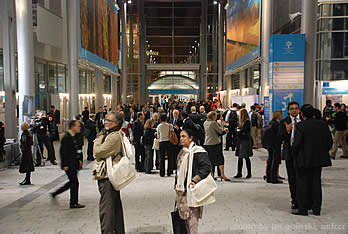
Discussion continues during a break
|
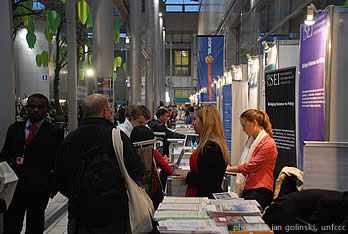
Exhibitors getting their message across
|
|
1 December
|
|
UNFCCC Executive Secretary Yvo de Boer briefing the press on the opening day of the Poznań Conference
Download as Podcast
|
Briefing the media on the opening day of the conference, Yvo de Boer emphasized the crucial role of finance in reaching a long-term solution to climate change. "Advancing the commitment of industrialized countries is intimately linked to enhancing the engagement of developing countries" he said.
Poznań would show progress on ongoing work under the Convention and allow Ministers to present their vision of long-term cooperative action, he explained. His expectations for the meeting - being attended by almost 11.000 participants - included the launch of the Adaptation Fund, as well as significant advances on technology transfer, the CDM and the issue of deforestation.
Mr. de Boer highlighted two important signals received in 2007: The IPCC report, confirming the reality and impacts of climate change; and the Stern Review on the Economics of Climate Change, which said failure to act would equal economic failure on the scale of two World Wars and the Great Depression combined.
|
|
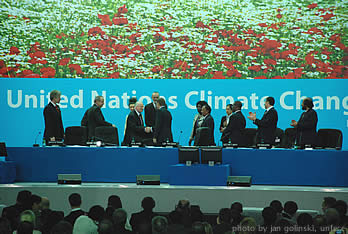
Opening of the Conference of the Parties (COP)
|
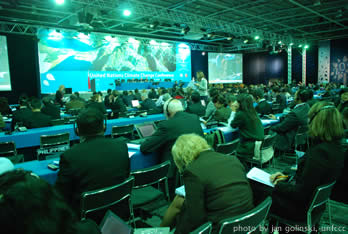
Opening of the Subsidiary Body for Implementation (SBI)
|
|
Welcome to Poznań
|
|
Video Message for Poznań
Download as Podcast
|
The 14th Conference of the Parties to the UNFCCC and the 4th meeting of Parties to the Kyoto Protocol will draw almost 11000 participants, including government delegates from the 187 Parties to the UNFCCC and representatives from business and industry.
The two-week meeting is the halfway mark in the negotiations on an ambitious and effective international climate change deal to be clinched in Copenhagen in 2009. Parties have little more than a year to agree on strengthened action on mitigation, adaptation, finance and technology.
A compilation paper of proposals for solutions has been put together. This can serve as a first version of a negotiating text in Poznań. Because of the limited time still available, it is critical that real progress is made and that Parties identify which proposals to take forward in 2009.
|
|
Previous days - Back to main page
|